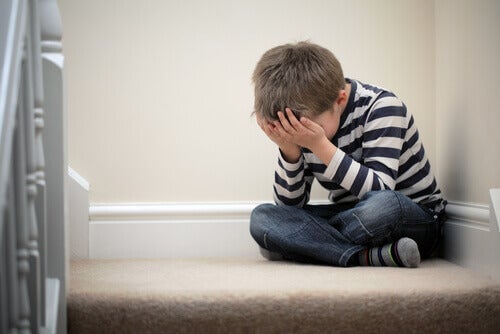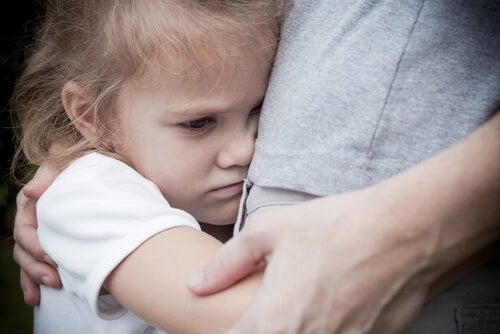School Phobia: When School Becomes a Problem

Many people fear the dark, certain animals, and natural phenomena such as storms, among other things, as children. But in most cases, those fears start to go away as they grow. However, there’s one fear that’s really hard for children to deal with: school phobia.
Phobias are called “evolutionary fears“. But what happens when one sticks with you for too long and is so extreme that it actually interferes with your life? Due to the fact that education is such an integral part of childhood and adolescence, school phobia can certainly do that.
What exactly is school phobia?
School phobia is basically the irrational and excessive fear of school or certain school-related things. This may lead a lot of children to have a lot of trouble going to school or staying there the entire day.
School phobia may be caused by:
- The rejection of classmates or teachers.
- Academic performance issues.
- Frequent school change.
- Trouble at home.
- Certain illnesses and the symptoms that come with them.
All of these situations may lead to an anxiety episode, along with motor, physiological, and cognitive alterations.

Cognitive symptoms
One of the main symptoms of school phobia is school-related negative thoughts. A child may also start to anticipate negative consequences (for example, being scolded by the teacher) for no reason.
A child with school phobia will probably have a negative view of their school performance. In addition, they may become fixated on their fear of vomiting, passing out, or experiencing other physical symptoms in front of their classmates.
Motor symptoms
The main motor symptom is avoidance. To put it more clearly, a child with this phobia will put up a fight (verbally or physically) when it’s time to go to school.
They may say they’re in pain or sick, not get out of bed, not get dressed, or not eat breakfast, among other things. They basically just don’t want to carry out any routine to get ready for school. Even if they do go to school, they may cry, scream, or cling for dear life to their parents so they don’t have to go inside.
Physiological symptoms
Some of the most common physiological symptoms are sweating, muscle tension, stomach pain, diarrhea, and dizziness.
School phobia vs. separation anxiety
If you want to know if your child has school phobia, you must first understand the difference between separation anxiety and this condition.
Separation anxiety is basically a child’s fear of being apart from the people they have a strong emotional bond with, most commonly their parents. It could happen at any time, such as when they go to school, go on a field trip, or even just before a sleepover at a friend’s house.
Thus, you need to figure out exactly why your child doesn’t want to go to school. If the root of their fear is separation anxiety, they probably don’t suffer from school phobia.

How to overcome school phobia
There are several techniques and methods to help a child overcome this phobia. According to many studies, the most effective are founded in cognitive-behavioral psychology. This field works on the assumption that changing your thoughts leads to behavioral changes and vice versa.
The most common methods are:
- Systematic desensitization. Can prove to be especially helpful if your child tries to avoid going to school. The technique works by only gradually exposing your child to their fear. The goal is to slowly reduce their anxiety so that they can see that nothing bad will happen.
- Social skill training. Part of a child’s fear may be related to classmate rejection. If that’s the case, you can help your child learn social skills so that they’ll be better equipped to build relationships with the other children at school.
- Cognitive restructuring. Restructuring involves changing the child’s irrational or exaggerated beliefs. Doing this will help them change the negative view they have of school or turn it into a more and positive realistic one.
- Relaxation training. Learning to use relaxation techniques can help a child control anxiety-related physiological symptoms.
The use of medication for school phobia
The main goal of treating school phobia is for your child to stop feeling anxiety, fear, or any other discomfort. Although doctors prescribe medication (mostly antidepressants) in some cases, you should carefully weigh the pros and cons of taking that path.
Some studies suggest that the side effects of these medications don’t justify their use, as certain therapies have proven to be effective. Therapy is generally the best, most effective option, and certainly the one with the most potentially long-lasting results.
All cited sources were thoroughly reviewed by our team to ensure their quality, reliability, currency, and validity. The bibliography of this article was considered reliable and of academic or scientific accuracy.
- García-Fernández, J.M., Inglés, C.J., Martínez-Monteagudo, M.C., Redondo, J. (2008) Evaluación y tratamiento de la ansiedad escolar en la infancia y adolescencia. Psicología Conductual, 16 (3), pp. 413-437
This text is provided for informational purposes only and does not replace consultation with a professional. If in doubt, consult your specialist.








